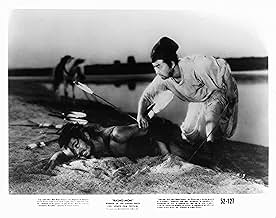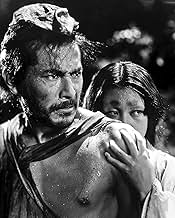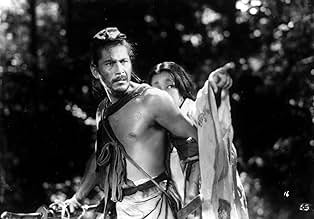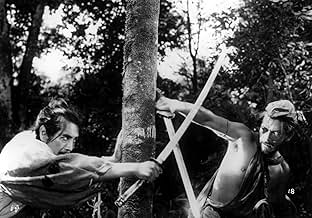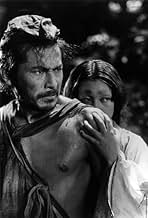Ein abscheuliches Verbrechen und seine Folgen werden aus unterschiedlichen Perspektiven erinnert.Ein abscheuliches Verbrechen und seine Folgen werden aus unterschiedlichen Perspektiven erinnert.Ein abscheuliches Verbrechen und seine Folgen werden aus unterschiedlichen Perspektiven erinnert.
- Regie
- Drehbuch
- Hauptbesetzung
- Für 1 Oscar nominiert
- 9 Gewinne & 5 Nominierungen insgesamt
Zusammenfassung
Reviewers say 'Rashomon' delves into the nature of truth and reality through multiple conflicting perspectives of a crime. Characters like the bandit, wife, samurai, and woodcutter offer varied accounts, showcasing subjective truth and human perception's unreliability. The film challenges viewers to question truth and personal biases' impact on storytelling. Its innovative narrative and cinematography highlight human nature's complexity and the struggle to find objective truth, receiving both acclaim and critique for its profound themes and structure.
Empfohlene Bewertungen
I cannot believe how incredibly stupid most people are. Most people seem to think that Rashomon was designed to show the difference in people's perceptions of an event. WRONG! This was obviously not even intended. The point of Rashomon is to show how people CANNOT ADMIT THEIR MISTAKES. We will do anything to deny the truth from themselves because the truth is too painful for most to bear. Rashomon's genius is in presenting this theme; sadly, most people are unable to grasp it (or maybe they don't want to...)
Rashomon by Akira is probably one of his very best, from his storytelling to the visuals, the picture is amazing.
The film is about about the truth, and burying it because no one can handle it. People prefer to live a lie than admit the truth, very reminiscent of today's world. The characters are talking to us, we are the jury.
The performances are amazing, nothing acting is so good, blows away today's competition.
The film score is stunning as well, one of my favourites from a Japanese film.
The direction is breathtaking, the jungle is beautifully lit, it has a sense of horror to it. Black and white was the perfect choice.
Overall, an amazing film from a genius!
The film is about about the truth, and burying it because no one can handle it. People prefer to live a lie than admit the truth, very reminiscent of today's world. The characters are talking to us, we are the jury.
The performances are amazing, nothing acting is so good, blows away today's competition.
The film score is stunning as well, one of my favourites from a Japanese film.
The direction is breathtaking, the jungle is beautifully lit, it has a sense of horror to it. Black and white was the perfect choice.
Overall, an amazing film from a genius!
'People forget the unpleasant things. They only remember what they want to remember.'
In Rashomon the editing tells ½ of the story. It may feel experimental or unconventional, but Kurosawa perfects the concept second by second, directing and editing. This film didn't need a big budget to come perfectly to the point. It's a simple tale, but not a superficial tale. Different points of view and selective memories ('It's true! I saw it!') don't only make the woods unsafe, but are one of the most universal topics of humanity. 'We humans are weak creatures. That's why we lie, even to ourselves' says it all actually: it's about what people want to hear and when they start being interested at all, apart from wishful thinking. Selfish excuses vs trust in other people.
Rashomon gets masterful when in one instant there is literally a different point of view: the camera takes another position to shoot the same sequence, thereby forcing the audience to reconsider what they just saw. That is the sort of storytelling that the supposed masters of cinema in our time yet have to equal, or try to copy when they fail. Admitted 'Memento' (2000, Nolan) is a truly great one. Still not THAT universal. 'Pulp Fiction' (1994) didn't come close, 'La Commare Secca' (1962) also didn't. 'Ghost dog: the way of the samurai' (1999) touched another border of the concept, or does it?
The use of (non-original) music in my opinion reveals a certain interest for western influence, not only in Rashomon, but also in Kurosawa's forthcoming films, and is probably why his films were so influential on western filmmakers too.
The cinematography is dynamic and changes scene by scene to emphasize exactly what is going on. The shadows of leaves and branches, captured by cinematographer Kazuo Miyagawa, make you really feel 'in the woods', while the actors (Toshirô Mifune, Takashi Shimura) convince the remaining part of the audience (which adds up to 100% breathless viewers). It may be after days that you first realize you saw an important film. After weeks you realize that you must see it again to comprehend (despite it's only 85 min), and ironically that is just one of the crucial points that Kurosawa made. 10/10
In Rashomon the editing tells ½ of the story. It may feel experimental or unconventional, but Kurosawa perfects the concept second by second, directing and editing. This film didn't need a big budget to come perfectly to the point. It's a simple tale, but not a superficial tale. Different points of view and selective memories ('It's true! I saw it!') don't only make the woods unsafe, but are one of the most universal topics of humanity. 'We humans are weak creatures. That's why we lie, even to ourselves' says it all actually: it's about what people want to hear and when they start being interested at all, apart from wishful thinking. Selfish excuses vs trust in other people.
Rashomon gets masterful when in one instant there is literally a different point of view: the camera takes another position to shoot the same sequence, thereby forcing the audience to reconsider what they just saw. That is the sort of storytelling that the supposed masters of cinema in our time yet have to equal, or try to copy when they fail. Admitted 'Memento' (2000, Nolan) is a truly great one. Still not THAT universal. 'Pulp Fiction' (1994) didn't come close, 'La Commare Secca' (1962) also didn't. 'Ghost dog: the way of the samurai' (1999) touched another border of the concept, or does it?
The use of (non-original) music in my opinion reveals a certain interest for western influence, not only in Rashomon, but also in Kurosawa's forthcoming films, and is probably why his films were so influential on western filmmakers too.
The cinematography is dynamic and changes scene by scene to emphasize exactly what is going on. The shadows of leaves and branches, captured by cinematographer Kazuo Miyagawa, make you really feel 'in the woods', while the actors (Toshirô Mifune, Takashi Shimura) convince the remaining part of the audience (which adds up to 100% breathless viewers). It may be after days that you first realize you saw an important film. After weeks you realize that you must see it again to comprehend (despite it's only 85 min), and ironically that is just one of the crucial points that Kurosawa made. 10/10
It's hard to tell just how striking "Rashômon" might have seemed to those who watched it in 1950, rather than seeing it after so many subsequent movies and other works have made use of its techniques and ideas. But it's clear that it is a technical and creative success. The story itself is not particularly satisfying, which was most likely by design, and the movie is carried by its structure and by the concept of the markedly different perspectives on the same series of events. The cast also deserve their share of credit for how well it works, and the photography is excellent, as it is in almost all of Kurosawa's films.
Kurosawa's expertise makes the interwoven sequences of past and present - essentially telling two different stories - not only work flawlessly, but fit together thematically. It's even more commendable when compared to some of the subsequent films that have tried to use similar ideas, only to come off as pretentious rather than creative or innovative. Kurosawa was also working with much less in terms of possible precedents.
In one sense, the choice of specific story material could seem a little odd.
The downbeat, rather sordid scenario makes the movie somewhat less enjoyable than several of Kurosawa's other pictures (which is, admittedly, a pretty high standard), and as a result "Rashômon" is more a film to respect and admire than one to enjoy and take pleasure from. Still, it does have significantly more substance to it than do most of the more recent pictures that have been deliberately downbeat or negative in their portrayals of humanity. Such stories are more trendy at present, and they often receive undue praise simply for so being.
At the same time, the lack of sympathetic characters and the paucity of hopeful developments bring out all the more its success in developing its ideas about narrative and about reality, ideas that are more fundamental and, in their way, perhaps at least as important as any specific story or events.
Kurosawa's expertise makes the interwoven sequences of past and present - essentially telling two different stories - not only work flawlessly, but fit together thematically. It's even more commendable when compared to some of the subsequent films that have tried to use similar ideas, only to come off as pretentious rather than creative or innovative. Kurosawa was also working with much less in terms of possible precedents.
In one sense, the choice of specific story material could seem a little odd.
The downbeat, rather sordid scenario makes the movie somewhat less enjoyable than several of Kurosawa's other pictures (which is, admittedly, a pretty high standard), and as a result "Rashômon" is more a film to respect and admire than one to enjoy and take pleasure from. Still, it does have significantly more substance to it than do most of the more recent pictures that have been deliberately downbeat or negative in their portrayals of humanity. Such stories are more trendy at present, and they often receive undue praise simply for so being.
At the same time, the lack of sympathetic characters and the paucity of hopeful developments bring out all the more its success in developing its ideas about narrative and about reality, ideas that are more fundamental and, in their way, perhaps at least as important as any specific story or events.
"Rashomon" was Akira Kurosawa's first national hit (becoming, at the time, the highest-grossing foreign film in America) and even gained an Oscar for Best Foreign Film, but almost sixty years later it still hasn't lost any of its impact. It is widely revered as one of the most influential films of all-time, but unlike some other movies, it is not a film that feels dated. The revolutionary methods of Kurosawa are still effective and on-par with the cinema of today -- this isn't a movie where you say, "Yeah, fifty years ago it might have been different, but now it's done in all the movies." Kurosawa's techniques are still superior to most of his imitators. Look at the 2003 John McTiernan film, "Basic," which copies a good portion of "Rashomon's" concept. Which is the better film? It's not a hard choice.
The film begins under a structure which reads "Rashomon" on its exterior, in a small Japanese village. It's raining outside and a woodcutter (Takashi Shumura) and a priest (Minoru Chiaki) inadvertently find themselves in the company of a wandering commoner (Kichijiro Ueda), and as he asks them what is the matter they both begin to relay the most horrific story they claim to know -- of a brutal murder a few days prior.
Kurosawa then switches to flashback and we see three different versions of the exact same event -- the slaying of an innocent man (the murderer played by Kurosawa film regular Toshirô Mifune) in the woods outside the village. Was it because of lust? Betrayal? Envy? Or insanity? We hear from the murderer, the wife of the victim, and a woman channeling the spirit of the dead man.
"Rashomon" is brilliant. Some people have complained that the ending is a cop-out and sentimental hogwash, but I think Kurosawa was fond of sentimentality to a point (he uses a good deal of it in "Ikiru") but the difference between what he does with sentimentality as opposed to many filmmakers of today is that he uses to to ENRICH the story, not provide an easy solution to all the problems.
Is there resolution in the finale of "Rashomon"? To a degree. But, like "Ikiru," it also leaves an open answer to its audience -- this film questions us, and our humanity, and it says something about the human condition and our weaknesses as a species. Yet it also proposes that along with the evil is an inherent good, and in my opinion the message of "Rashomon" is just as important and effective as its film-making techniques and acting.
The film begins under a structure which reads "Rashomon" on its exterior, in a small Japanese village. It's raining outside and a woodcutter (Takashi Shumura) and a priest (Minoru Chiaki) inadvertently find themselves in the company of a wandering commoner (Kichijiro Ueda), and as he asks them what is the matter they both begin to relay the most horrific story they claim to know -- of a brutal murder a few days prior.
Kurosawa then switches to flashback and we see three different versions of the exact same event -- the slaying of an innocent man (the murderer played by Kurosawa film regular Toshirô Mifune) in the woods outside the village. Was it because of lust? Betrayal? Envy? Or insanity? We hear from the murderer, the wife of the victim, and a woman channeling the spirit of the dead man.
"Rashomon" is brilliant. Some people have complained that the ending is a cop-out and sentimental hogwash, but I think Kurosawa was fond of sentimentality to a point (he uses a good deal of it in "Ikiru") but the difference between what he does with sentimentality as opposed to many filmmakers of today is that he uses to to ENRICH the story, not provide an easy solution to all the problems.
Is there resolution in the finale of "Rashomon"? To a degree. But, like "Ikiru," it also leaves an open answer to its audience -- this film questions us, and our humanity, and it says something about the human condition and our weaknesses as a species. Yet it also proposes that along with the evil is an inherent good, and in my opinion the message of "Rashomon" is just as important and effective as its film-making techniques and acting.
Wusstest du schon
- WissenswertesOften credited as the reason the Academy created the "Best Foreign Film" category.
- PatzerAt the beginning of the film when the woodcutter finds the dead body, the arms and hands are stiff and raised. However; you can see both arms slightly moving. Apparently, they used a real person, and the actor playing the dead person was unable to keep the arms perfectly still.
- Alternative VersionenCriterion Collection releases of this film feature an English Dubbed Version in addition to the traditional, original Japanese version. This is unusual in that Criterion are usually film purists that do not put English language dubs on their discs that contain a foreign language film.
- VerbindungenEdited into Papillon d'amour (2004)
- SoundtracksWoman's Tale Theme (Bolero)
Written by Fumio Hayasaka inspired by Maurice Ravel's "Bolero", using the same background rhythm, and similar orchestration and build-up, but different melodic lines.
Top-Auswahl
Melde dich zum Bewerten an und greife auf die Watchlist für personalisierte Empfehlungen zu.
Details
Box Office
- Budget
- 250.000 $ (geschätzt)
- Bruttoertrag in den USA und Kanada
- 46.808 $
- Eröffnungswochenende in den USA und in Kanada
- 15.942 $
- 28. Juli 2002
- Weltweiter Bruttoertrag
- 139.819 $
- Laufzeit
- 1 Std. 28 Min.(88 min)
- Farbe
- Seitenverhältnis
- 1.37 : 1
Zu dieser Seite beitragen
Bearbeitung vorschlagen oder fehlenden Inhalt hinzufügen


